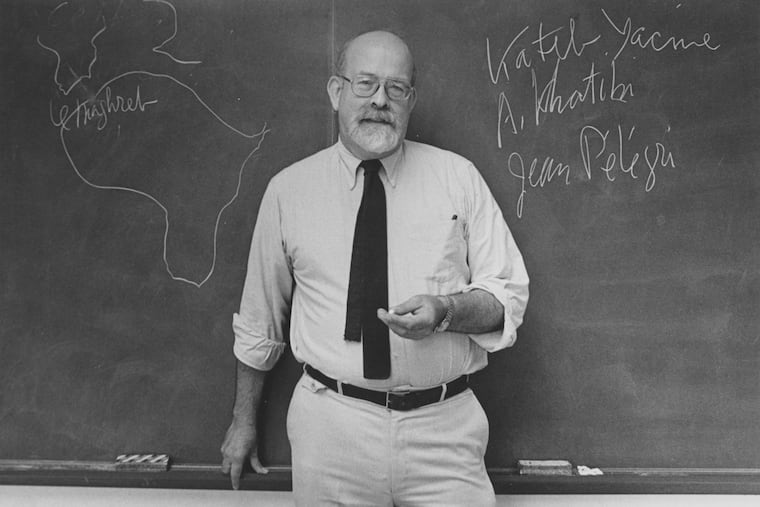Eric Sellin, longtime Temple language professor, writer, and translator, dies at 87
Recognized by many for his expertise in linguistics, he served on the selection committee for the 1984 Neustadt International Prize for Literature.

Eric Sellin, 87, of Philadelphia, a longtime professor of language at Temple and Tulane Universities, versatile writer, and prolific translator, died Friday, Oct. 8, of coronary artery disease at his home in Hopkinson House on Washington Square.
Fascinated by language and literature throughout his life, Dr. Sellin was a pioneer in making the work of foreign-language writers available to English-speaking readers for half a century. Starting in 1956, he translated hundreds of works for journals, anthologies, and other publications by writers from Africa, Europe, and elsewhere, and was working on projects until shortly before his death.
He spoke English, French, Swedish, Italian, and Arabic, and taught classes and lectured about language in the United States, France, Algeria, Senegal, and elsewhere. He became a French instructor at Temple in 1962, was a professor from 1970-91, and served as chairperson of the college’s Department of French and Italian from 1970-1973.
Dr. Sellin left Temple for Tulane in New Orleans in 1991, and worked there as chairperson of the Department of French and Italian, and French professor until 2001. He also taught classes at the University of Pennsylvania and Clark University.
He published several books on linguistics and translation, including this year’s The Magic Mirror of Literary Translation: Reflections on the Art of Translating Verse. In that 128-page book, he wrote, “A good translation is faithful to the original in content and intent.”
Critic Katherine M. Hedeen called the book “accessible and entertaining” and a “solid introduction to a certain kind of approach to translating poetry for a nonacademic audience.”
Creative and athletic as well as scholarly, Dr. Sellin also published his own books of poetry, and about soccer, his love away from the office.
“There was nothing stuffy about him,” said Birgitta, his wife of 63 years. “He was very sweet, lovable, and spontaneous.”
Born Nov. 7, 1933, Dr. Sellin grew up in West Philadelphia, and graduated from Germantown Friends School. He became enamored of foreign languages and life outside the United States as a teenager when he traveled with his family, and spent time in Switzerland and elsewhere.
At Penn, he earned a bachelor’s degree in French, and a master’s degree and doctorate in the Romance languages. He met his wife, who is from Sweden, while studying in Rome. They married in 1958, lived for years in Bala Cynwyd, and raised sons Fred and Chris.
“He was very exacting in his translation work,” said his son Chris. “He understood the importance of meaning, and meter, and rhyme. He was both scholarly and creative.”
Dr. Sellin was a member, editor, and literary consultant for many professional organizations. He earned fellowships, grants, and awards from the Fulbright Program, the American Philosophical Society, the National Endowment for the Humanities, the American Council of Learned Societies, and other groups.
In 1981, he founded the Center for the Study of Francophone Literature of North Africa, and the CELAAN Review, which features the work of North African writers. When he retired from Tulane, Dr. Sellin donated his extensive collection of correspondence with writers and scholars from all over the world to the Harry Ransom Center at the University of Texas at Austin.
When he wasn’t working, Dr. Sellin played soccer, was a soccer referee, and vacationed in Long Beach Island and New Hampshire. He collected whistles and wrote about their differences in tones, and he and his wife traveled extensively throughout Africa and Europe.
“He used to sit and talk with his writer friends at cafés in France,” his wife said. “He just loved human beings and literature. There was never a boring time with him.”
In addition to his wife and sons, Dr. Sellin is survived by a brother, and other relatives. A brother died earlier.
Private services are to be held later.